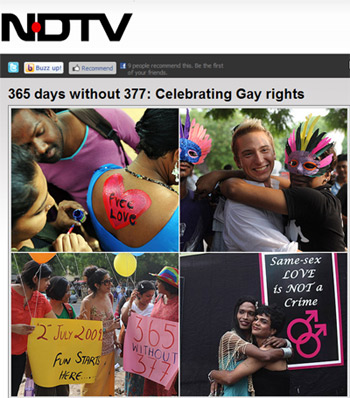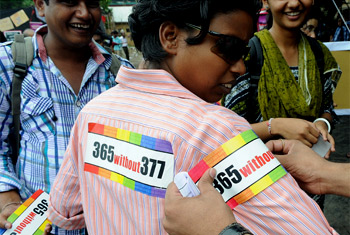
NDTV noted in its photocoverage of the celebrations across India:
The gay community celebrated the first anniversary of the
historic verdict across the country on Friday with colourful
parades, songs and dances.

On July 2 last year, the Delhi High Court overturned the 150-year-old section 377 of the Indian Penal Code, which penalised male-to-male sex with imprisonment up to 10 years or life. The celebrations in Delhi and Mumbai were well documented by the mainstream media.
The Hindustan Times described the scene in Delhi in "Gays celebrate one year of Delhi High Court judgment":
The participants of the one-year-celebration at Jantar Mantar seemed much more flamboyant and open, not only in their attire, but also behaviour. Many couples were openly kissing each other in front of around 50-60 policeman as well as numerous bystanders without any hesitation or fear.
The Times of India reports in "Pink India tiptoes out of the closet":
The change may be slow in coming, but it is undoubtedly on the way. In the last year,activists say there has been a spurt of gay activity in the open, not just in the overhang. Four-letter words like LGBT have become part of the public vocabulary. Middle-aged heteros can now say gay without breaking into a rash. But that was as far as public education went. A member of the LGBT community who did not want her identity revealed said the verdict had not really affected the personal journeys of people coming out. "What it has done is bring the subject home to the dinner table. And by that service, it is now easier for young gays to gauge the reactions of family and friends to the issue."
It has also taken away some of the stigma associated with being gay. "That it is now legal demolishes many of the arguments stacked against it," she says.
"One of the upsides to the verdict is that we can no longer sweep homosexuality under the carpet saying it's a western phenomenon," says Anjali Gopalan, executive director of Naz Foundation which brought the challenge to the gay sex law. "Still,the judgment didn't automatically bring with it a change in social attitudes. For those to change, it's important to engage society as a whole."
In "Happy to be gay!", the Times highlighted new businesses targeting gay clientele such as Indjapink, India's first dedicated online gay travel boutique; Azaad Bazaar, India's first LGBT (Lesbian Gay Bi-sexual Transgender) Pride Store in Mumbai; and Queer-INK, an e-bookstore catering to the gay community that launched last Friday.
Mumbai, the glitzy and commercial capital of India, has meanwhile been dubbed the gay capital of the country.
"Is Mumbai emerging as India's gay capital?" asks NDTV highlighting the party scene, nightclubs, support groups and a magazine and by stacking the megacity up against Pune, Bangalore and New Delhi.
The Daily Mail says in "Mumbai emerges as India’s gay Capital":
In the last two months, there were more than 20 parties organised only in Mumbai. While Delhi hosted 15, 10 were held in Bangalore and there weren’t any in Pune... While Mumbai has nearly half a dozen active gay support groups, it’s not so in Delhi, Bangalore and Pune. If here the city has a magazine for gays, Bombay Dost, then Pune has two PUCK and The Queer Chronicle.
Prominent journalist and activist Vikram Doctor noted in his column "How things are finally changing for gays in the workplace" for The Economic Times that while the law has changed coming out in the workplace is still a challenging process for many:
It could be due to personal constraints, or perhaps it's the knowledge of the unthinking homophobia of fellow employees, but many can't bring themselves to take that last step and come out. Which is in itself a problem because, while offices vary in their levels of informality, most would probably qualify as semi-personal spaces, where a certain level of personal is expected from co-workers, and those who can't open up are seen as a bit odd. Lesbian and gay employees then find themselves in a fix. They know that ideally, for both personal and professional reasons, they should be open and at ease about who they are — and yet they have good reasons to fear the consequences if they are open.
He also notes that an increasing number of multinationals have such policies as part of global equal employment mandates, even Indian multinationals like Infosys and Tata have written policies guaranteeing equal treatment or prevention of harassment on a number of grounds, including sexual orientation or sexuality as they realise the need and benefits of matching global standards.
On June 27, about 300 marched in the second edition of the 'Chennai Rainbow Pride March'.
